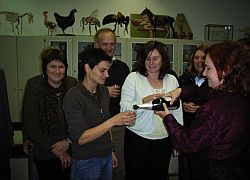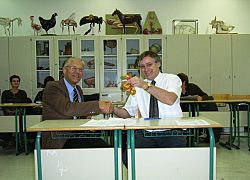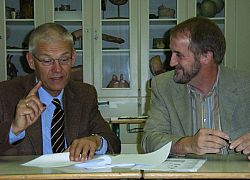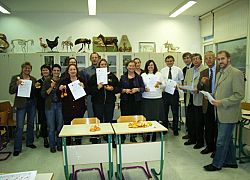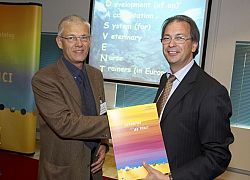DASVENT
Information about the DASVENT project (2005-2007)
The DASVENT project has officially finished. The accreditation board & system will continue under the name ACOVENE (www.acovene.com). Below you can find the offical summary of the project. Development of an Accreditation System for Veterinary Nurse Trainers in Europe
What we are going to do:
We are going to develop an accreditation system for Veterinary Nurse Trainers. This accreditation system will be developed with the help of VETNNET, a stable European network of Veterinary Nurse Trainers and associated institutes. The employers, represented by the FECAVA and the RCVS, will also play an essential role in developing the system.
An existing American accreditation system will be used as an example, in order to accelerate the process of developing our own European system. We are going to subcontract Dr. Guy Hancock, DVM, from the Committee on veterinary technician education and activities (CVTEA) as an external consultant. The CVTEA is the organisation who performs the accreditation visitations in the USA.
The system will be a tool for quality assurance. It will increase the transparency of the European programs and will include self evaluation methods.
A committee will be formed who will do visitations at the institutes that wish to become accredited and who will give recommendations regarding the accreditation. The committee will be formed by VETNNET in cooperation with European Veterinary and Veterinary Nurse organisations, as well as qualifying bodies. VETNNET already has intensive contact with these organisations and we have included several of them in the partnership of this project (RCVS, FECAVA, AEQUOR). The final decision on accreditation will be made by a European board of employers (veterinarians), who are also included in this project. The FECAVA will play a major role in this as they represent the majority of the European employers (companion animal veterinarians).
To facilitate the accreditation system we will develop a syllabus of European “competences” for Veterinary Nurses.
Project aims are:
* formation of an accreditation board and visitation committee
* adapting the USA accreditation system to European standards
* developing a syllabus of European “competences” for Veterinary Nurses
* testing the accreditation system for acceptability
After the project has successfully ended, the accreditation board and the visitation committee will continue to exist as well as the accreditation system. Partner colleges who have received accreditation will have to remain accredited by repeated visitations & self evaluations over the years. Other colleges who have not been involved in the project will be invited to apply for accreditation. They will learn about this accreditation system through the European networks “VETNNET” and “Europea” or through the internet.
The costs of the accreditation will be carried by the individual colleges. They will pay a yearly fee to stay accredited. The fees will cover the administration costs, the costs for the visitation committee and the costs for the accreditation board.
Why we are going to do this:
At this moment there is no European standard for veterinary nurse training. Some countries have an existing national qualification, other don’t. Employers throughout Europe are not familiar with the level of education in other countries, and therefore employability of nurses outside there home country is disabled. With the proposed system of accreditation we are creating transparency and quality assurance. The system will contribute to the solution for regional differences in unemployment in this sector in Europe by facilitating the movement of people over member state’s boundaries.
Especially in a sector of vocational training like veterinary nurse training, which is a rather young sector – some countries have non yet or are just starting a national course – there is a need for transnational cooperation. The success of the VETNNET network supports this conclusion.
During a preceding project a Euro Syllabus was developed on a basic level, which is going to be a basis to start from. Taking into consideration the recent development of “competency based learning” we need to identify the European competences of a veterinary nurse. This preceding project has identified the need for a system of accreditation and also tested the feasibility of it. The outcomes were outstanding.
Information about EU programs:
Leonardo Da Vinci programme is an initiative of the EU to enhance the vocational education and training, by making it more effective, closely related to the practice, even involving the employers and employees organisation. Knowing these objectives a common framework of objectives is drafted, which will be valid throughout the duration of the whole programme, which has started in 1995. The first phase of the programme concluded in 2000. The second phase will be in operation from 2001 till 2006. Each second year a new call for proposals is issued in the official publication magazine of the European commission, in which specific priorities are stated for the duration of the two years, concerning the development of the vocational training and education in Europe.
Basically what the programme aims to do is to sponsor projects that seek to develop a European dimension in education and to involve the profession, certifying bodies, and multiple levels in educational cooperation, to prepare graduates better to the EU labour market, to stimulate mobility and to increase transparency in curricula, to increase accessibility of education for everybody irrespectively of region, gender, disability, age. Giving the character of VETNNET many of these objectives are being met solely by cooperation within such a network. Therefore there is a large chance of getting sponsorship for our members.
For those members seeking to get sponsorship, please try to draft up a summary of the ideas early in the calendar year and then seek partners to write a good draft proposal. The first deadline for application will be in November 2003 by which date a pre-proposal has to be sent to the National Agency in your country, which will select a few good proposals to be invited for a further full proposal. Drafting a pre-proposal from a good project idea will take about one or two days for an experienced person, provided all the necessary documents (letters of Intent) are there. A decent full proposal will take 4 to 5 days. Before writing a proposal it may be usefull to download the supporting documents and guides for reference and to get the proposal in-line with the programme objectives and with the priorities of the call for proposals. All of these documents can be downloaded from: http://europa.eu.int/comm/education/leonardo.html.
Members with experience in application are: Telford College, CNFA, PeltoSalmi, Groenhorst College.
The Socrates programme is an initiative with much reseblence of the Leonardo programme, but it is focussed at general education (from primary to Academic education)instead of vocational education. Application dead lines dependent of the type of programme, important dates: 1st March and 1st November.
Other programmes are Youth, Tempus, and the EU/USA EU/Canada cooperations.
Information on all educational programmes of the EU can be obtained from:
http://europa.eu.int/comm/education/index_en.html

